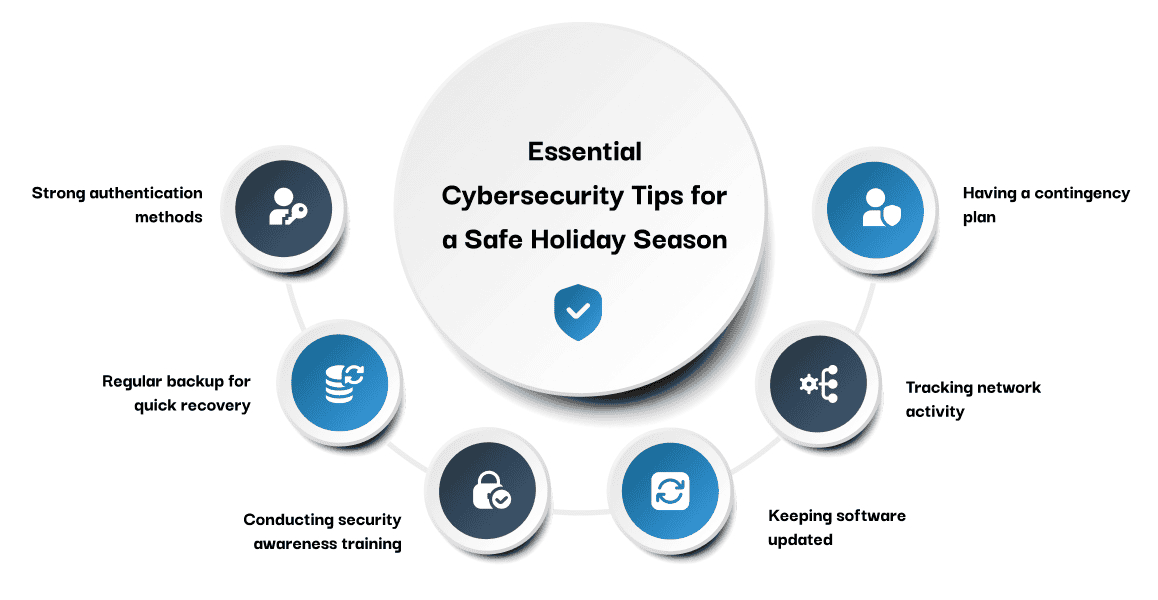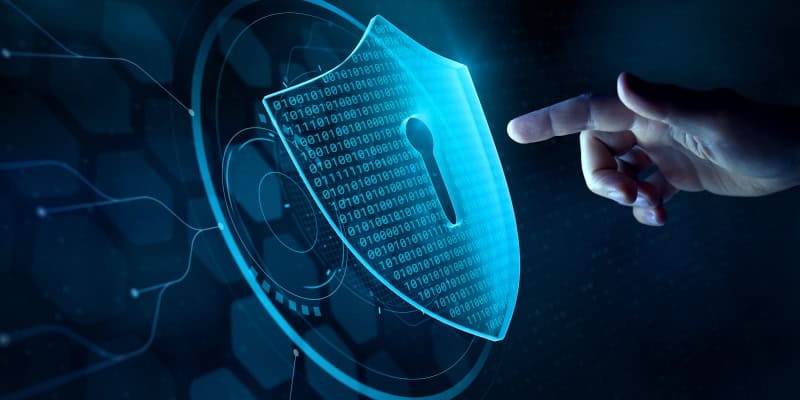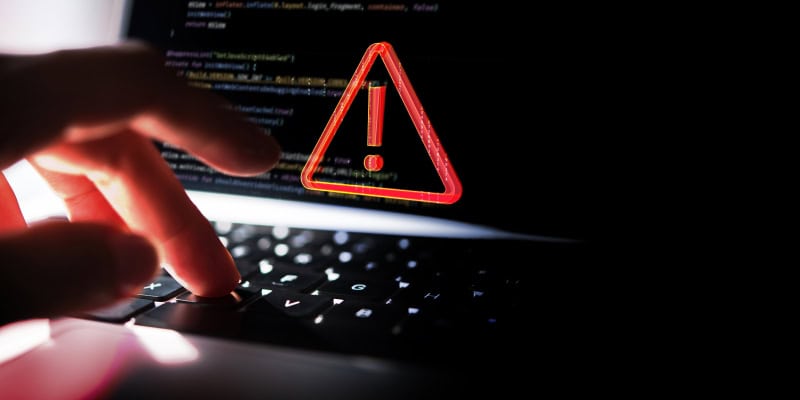Holidays bring joy and excitement. However, business owners, especially small business owners, often worry about increasing cyber threats. The holidays see a rise in digital traffic and transactions, which cybercriminals exploit. Therefore, cybersecurity during the holidays requires special attention. Protecting your business’s digital security is crucial for maintaining trust and operations. Let’s explore why cyberattacks increase during this season, the risks they pose, and practical cybersecurity solutions and tips to strengthen your defenses against these threats.
Spotting Common Cyber Attacks During Holidays
The holiday season escalates cyber attack risks, with notable surges in:
- Phishing attacks.
- Ransomware and DDoS (Distributed Denial-of-Service) attacks.
- Holiday scams.
Now, let us see them in detail:
-
Phishing attacks:
Phishing attacks increase by over 150% during the holidays. The festive season gives attackers an opportunity to send emails that look like holiday greetings or urgent requests, making it hard for employees to tell real emails from fake ones.
-
Ransomware & DDoS attacks:
Ransomware attacks, which lock data until a ransom is paid, increase during the holidays due to reduced IT support. Similarly, DDoS attacks flood systems with fake traffic, causing outages and financial losses, especially for e-commerce businesses during peak times.
-
Holiday scams:
Holiday scams result in significant financial losses. These scams tarnish business reputations and erode customer trust.
Here are common holiday scams and their prevention measures:
1. Online shopping scams: Cybercriminals create fake deals and offers and circulate them through fake websites, phishing emails, and social media advertisements. These scams attempt to collect personal information or payments for products that do not exist.
Shop only with reputable online retailers, and be wary of unrealistic deals that are too good to be true.
2. QR code scams: Scammers place fraudulent QR codes in public spaces under the guise of holiday special offers or promotions. Upon scanning, these codes direct victims to harmful websites that steal personal and payment details.
Exercise caution with QR codes from unknown sources and confirm promotions with official retailers.
3. Fake shipping delivery notifications: Scammers distribute messages that seem to be from legitimate shipping companies, claiming the existence of delivery issues. These messages often contain phishing site links designed to steal personal information.
Use only official sites or apps to track your shipments.
4. Holiday travel scams: Fraudsters offer deceptive travel deals or exclusive holiday packages to trick people into providing personal information or making advance payments.
Ensure safety by booking directly with verified airlines, hotels, or legitimate travel sites.
5. Fake charity scams: Scammers establish fake charities to take advantage of holiday generosity. They often use emotional appeals through phone calls, emails, or social platforms to request donations.
Verify the charity’s authenticity before making any contributions.
Also Read: Why SMBs Should Adopt an Enterprise Mindset in Cybersecurity
Understanding the Spike in Cyberattacks During Holidays & Vulnerabilities
Why do cybercriminals love the holiday season? As festivities peak, businesses and consumers get caught up in the rush, inadvertently providing cybercriminals with the perfect conditions and opportunities for cyber threats, stressing the need for strong cybersecurity measures.
Several factors make this period attractive for attackers, including:
- Increased online traffic
- Large volume of data transactions
- Employee distraction
Let us examine the specific areas where businesses become most vulnerable during the holiday season, from IT support gaps to business impacts, to take necessary precautions:
-
IT support challenges:
Holidays often mean reduced staffing, as many employees take leave. This naturally includes the most critical IT professionals—the threat mitigators. With fewer experts available to combat threats, your ability to address security issues diminishes, creating delays in threat responses and potentially exposing digital assets to attacks. This is especially risky for organizations that depend on their in-house cybersecurity teams.
-
Employee vulnerabilities:
The festive atmosphere and holiday responsibilities add to employees’ stress, leading to lapses—employees working on holidays are absorbed in the holiday rush and under increased demand, making them likely to be distracted and neglect crucial security practices. This compounds the tasks for businesses experiencing demand spikes and leads to security protocol oversights, offering cybercriminals a golden opportunity.
-
Remote work risks:
Remote work increases during holidays as employees travel or work from home. This opens vulnerabilities, especially if they use an unsecured/less secure home or public Wi-Fi, increasing the risks. This bypasses official protective measures, making it easier for cybercriminals to exploit your systems.
-
Business impact:
Financial stakes are higher during holidays. Significant sales occur during this time, and disruptions can result. Nearly half of small businesses face cyber breaches during holidays. Awareness and robust measures are crucial to protect digital assets from cybercriminals exploiting festive periods.
Understanding why this season is prone to cyber threats and recognizing these vulnerabilities empowers business owners, particularly small businesses, to fortify their defenses against specific attacks. By identifying these risks early, you can take targeted measures to safeguard your business from increased cyberattacks and avoid becoming an easy target during these vulnerable times.
Enhancing Cybersecurity Before Holidays
Can we fortify our defenses for the holidays? Yes, you can by resorting to the below measures:
- Strong authentication methods, such as Multi-Factor Authentication (MFA), act as barriers to thwart unauthorized access even if passwords are compromised.
- Regular backups, employee education on recommended practices, and cyber insurance are key components of a comprehensive strategy. These measures mitigate risks and ensure quick recovery in case of a calamity.
- Educating employees through security awareness training sessions, including phishing simulations, keeps them aware of common threats and practices for avoiding attacks.
- Updating software and devices regularly reduces vulnerabilities cybercriminals could exploit. Ensure that both your company’s systems and employees’ devices are kept current to reduce exposure.
- Continuously track network activity around the clock for early indicators of cyberattacks. Smaller organizations with limited or no IT resources should collaborate with a Managed Security Service Provider (MSSP) to ensure ongoing protection and a swift response to emerging threats.
- Last but not least, prepare a contingency plan to swiftly recover from a cyberattack. The faster you can resume operations, the lower the financial impact of an attack, especially during the busy holiday season.
Given the cybersecurity during the holidays, it is crucial to implement these preventive measures ahead of time to ensure you are not caught off guard during peak traffic periods. Cybersecurity requires ongoing vigilance and adaptation to new threats to ensure a secure holiday season for your business.
Preparing for a Secure New Year: Strengthen Your Cyber Defenses
Cybersecurity concerns during the holidays are a reality. Cyber threats evolve, and so should strategies and measures to combat them. At CMIT Solutions in Silver Spring and Rockville, we specialize in delivering top-tier IT services to safeguard your business against emerging cyber threats. Stay alert and ready to protect your business from cyber threats so it can grow without disruption. Let this commitment to security be your stepping stone into a prosperous new year, where resilience shines as brightly as holiday lights.
Upgrading defenses can protect your business and lay the foundation for a safer future—reach out to us today!
Our IT Services
| Managed IT Services | Cybersecurity | Productivity Applications |
| IT Support | Cloud Services | Network Management |
| Compliance | Data Backup | Unified Communications |
| IT Guidance | IT Procurement |





